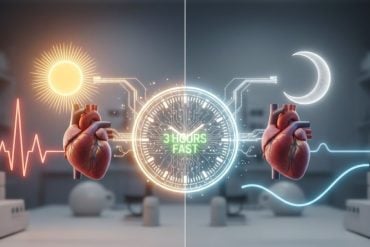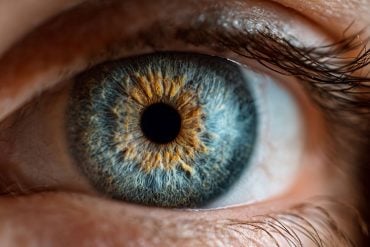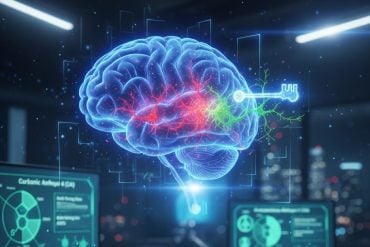Summary: Typically, many people associate depression with feelings of sadness or despair. However, depression can also affect your cognitive abilities and memory. A new paper reviews the impact depression has on cognitive function and considers therapy options to help improve these often overlooked symptoms of the disorder.
Source: Neuroscience News.
When you’re depressed, you aren’t the best version of yourself. You may be feeling sadness, hopelessness or despair, but these aren’t the only symptoms of depression. Depression can lead to alcoholism and suicide, but there’s one lesser-known symptom of depression that people live with every day.
Depression doesn’t just get in the way of being happy. It can also interrupt your ability to think. It hampers your attention, memory and decision-making abilities. You may find that your executive functions are limited, so you begin having trouble seeing your way through issues. Depression typically stems from an interruption or reduction of the brain’s chemical messengers. These interruptions may also impair your cognitive abilities.
Attention
Many people who suffer from depression may also have been diagnosed with another mental health disorder, including attention deficit disorder (ADD). In addition, people with depression are also more likely to experience attention problems. Researchers don’t yet know exactly what causes attention problems in people with depression, but there is a correlation between the two. Both people with unipolar an bipolar depression experience concentration problems, regardless of age.
It’s also worth mentioning that some antidepressant medications may have cognitive side effects. If you suffer from depression-related attention problems, you may have trouble focusing on one task long enough to complete it. If you notice a sudden onset of attention issues, talk to your doctor. There’s a chance your attention issues may stem from depression or another medical issue.
Memory
If you’re suffering from depression, you may also have trouble with memory loss. It’s a fairly common symptom of depression, so know that you’re not suffering alone.
In 2013, researchers discovered that people with depression had trouble identifying objects that were identical or similar to objects they had just seen. A 2015 study published in Cognition & Emotion also concluded that depression may cause short-term memory loss. When you’re experiencing depression-related memory loss, you may not remember what you ate for breakfast, or you may forget the details of a significant event. Keep in mind that there are many other causes of memory loss, so talk to your doctor about your symptoms.
Executive function
Depression may also impact your executive function, which affects your ability to process information. Executive function is often called the CEO of the brain because it’s in charge of getting things done.
Executive function impairments may get in the way of simple tasks like paying bills or remembering to return a phone call. This important brain function helps us manage time, shift focus, plan and organize and remember important details. Executive function problems are often acute and may be more likely to occur when someone is exceptionally stressed, sad or sleep deprived. Fortunately, anyone can improve their executive function at any time with educational strategies and behavioral approaches. If you’re experiencing issues with executive function, try breaking large tasks down into smaller chunks, create to-do lists and review them frequently.
Decision-making
Because depression impairs your ability to make decisions, you may have trouble making even minor decisions like where to go for dinner. Experts often help patients combat indecision with therapies like cognitive behavioral therapy (CBT). These treatments help patients analyze choices and see all the possible outcomes. People who suffer from depression-related indecision can also make their lives easier by limiting the number of decisions they have to make. For example, they may have the same thing for breakfast every morning or take the same route to work every day.
How to treat depression-related cognitive impairment
It’s important to remember that the cognitive impairment, in this case, is a symptom of another condition. There are short-term solutions to treating and living with cognitive impairment, but the best long-term solution is to treat the depression itself. Depression can be treated with therapy and/or medication. Selective serotonin reuptake inhibitors (SSRIs) may also help alleviate depression-related cognitive impairment. In the same way, treating depression with medication-free therapy may have the same effect over a more extended period of time.

During depression treatment, problem-solving treatment can train people how to solve problems. CBT can teach people to recognize and address any distorted thinking patterns. And cognitive remediation therapy uses practice drills to help improve executive function and memory. All these treatments can be used on their own or in conjunction with medication to yield better results.
Life after depression
The good news about this symptom is that cognitive function may return after the depression is lifted. When people undergo depression treatment, they often experience marked improvement in all areas of cognitive function, including thinking, memory and executive function. There’s a reason why people say depression runs deep. It affects so much more than just your mood.
Depression can affect your immune function and cognitive abilities, making even simple things seem impossible.
If you or someone you know is exhibiting signs of depression, talk to a professional about treatment options.
About the Author: Trevor is a freelance writer and recovering addict & alcoholic who’s been clean and sober for over 5 years. Since his recovery began, he has enjoyed using his talent for words to help spread treatment resources, addiction awareness, and general health knowledge. In his free time, you can find him working with recovering addicts or outside enjoying about any type of fitness activity imaginable.
Source: Trevor McDonald – Neuroscience News
Publisher: Organized by NeuroscienceNews.com.
Image Source: NeuroscienceNews.com image is in the public domain.
[cbtabs][cbtab title=”MLA”]Neuroscience News “How Depression Affects Your Thinking Skills.” NeuroscienceNews. NeuroscienceNews, 9 June 2018.
<https://neurosciencenews.com/depression-thinking-skills-9297/>.[/cbtab][cbtab title=”APA”]Neuroscience News (2018, June 9). How Depression Affects Your Thinking Skills. NeuroscienceNews. Retrieved June 9, 2018 from https://neurosciencenews.com/depression-thinking-skills-9297/[/cbtab][cbtab title=”Chicago”]Neuroscience News “How Depression Affects Your Thinking Skills.” https://neurosciencenews.com/depression-thinking-skills-9297/ (accessed June 9, 2018).[/cbtab][/cbtabs]







